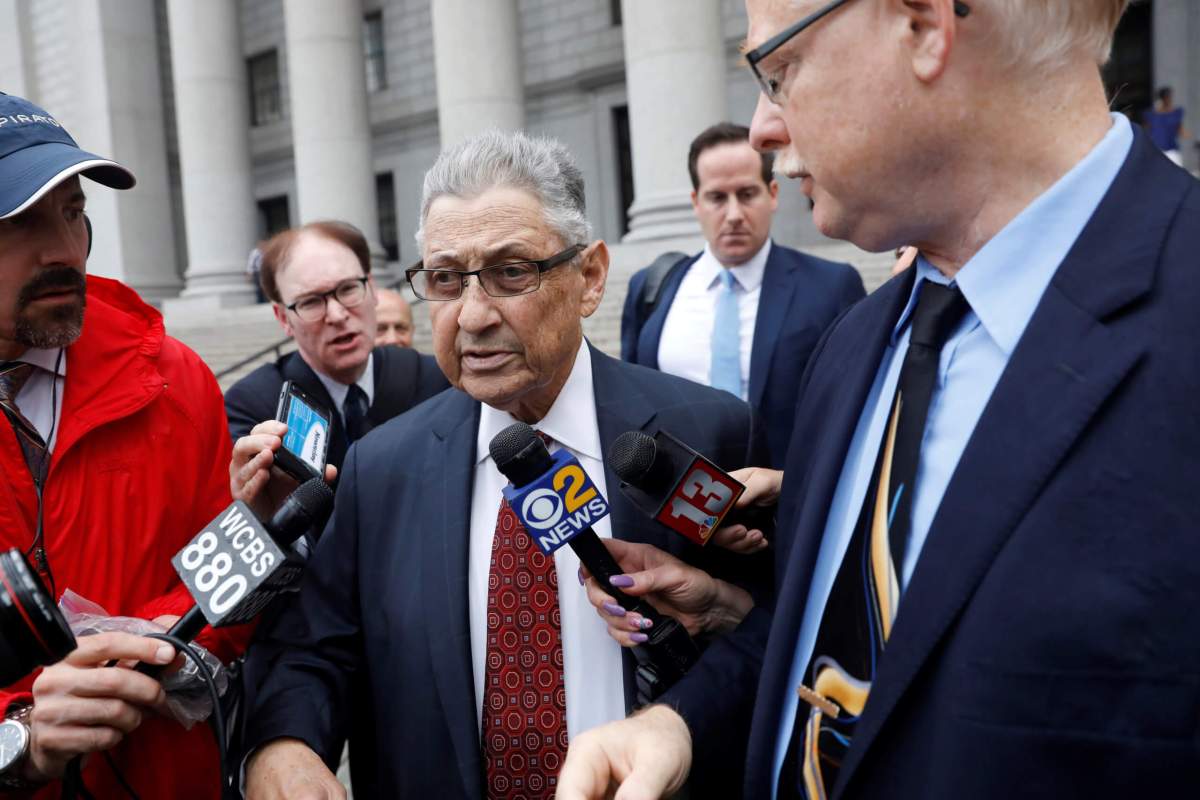Sheldon Silver, the former Manhattan lawmaker and Assembly speaker who rose to become one of the most powerful people in New York state only to fall to a scandal of his own making, died in federal prison on Monday at the age of 77, according to reports.
Federal records indicated that Silver was incarcerated at the time of his death at the FMC Devens, a minimum-security federal prison hospital in Massachusetts. The disgraced former lawmaker was serving a 6 1/2 year prison sentence after being convicted on federal corruption charges.
Silver had reportedly suffered from kidney ailments and cancer, and before his July 2020 sentencing, had written to federal Judge Valerie Caproni urging her to let him serve out his sentence under house arrest, saying, “I don’t want to die in prison.” Caproni denied Silver’s request.
His death in federal custody marked an ignominious end to a politician who had once been one of the biggest power brokers in New York state. As Assembly speaker, Silver was regarded as one of the infamous “three men in the room,” alongside the governor and the state Senate majority leader, that (for better or worse) hammered out budget deals and set the legislative agenda.
Silver grew up on the Lower East Side of Manhattan and went on to graduate from Yeshiva University and the Brooklyn Law School. He jointed the law firm of Schecter and Schwartz between 1968 and 1971, then was hired by New York City Civil Court Judge Francis N. Pecora as a law secretary.
Five years later, Silver hopped into politics and successfully won a seat in the State Assembly in 1976. He rose through the Democratic party ranks and became chairman of the powerful Assembly Ways and Means Committee in 1991.
Three years later, Silver succeeded the late Saul Weprin as the Assembly Speaker, and would hold that title for the next two decades.
Despite being a staunch Democrat, Silver found himself crossing the aisle and working with Republican Governor George Pataki in 1995 to pass legislation reinstating the death penalty in the Empire State. No one was ever executed in New York, however, and the state Court of Appeals eventually ruled the law unconstitutional in 2004.
Silver was also instrumental in helping to enact new rent regulations in 1997 and, two years later, a repeal of the commuter tax on non-resident earners.
Critics said the commuter tax repeal proved to be more of a boon for suburbanites and an economic hardship for city dwellers. Silver also took heat for failing to schedule a vote on a congestion pricing plan for Manhattan in 2007.
The Assembly speaker also faced heavy criticism in the late 2000s for failing to act on sexual harassment or misconduct cases. Silver and the Assembly leadership settled a lawsuit filed by two aides who were raped by his chief counsel, J. Michael Boxley, who later pleaded guilty to sexual misconduct. The suit was based on evidence that Silver and the Assembly tolerated a culture of sexual harassment.
Two other sex harassment cases were settled in 2012 and 2015 after former Assemblyman Vito Lopez, who chaired the Brooklyn Democratic Party, was found to have sexually harassed female aides. Silver received heavy criticism for again failing to take action to stop Lopez’s behavior.
But two weeks after his 11th re-election as Assembly speaker, in January 2015, Silver wound up under arrest on federal corruption charges. for accepting kickbacks from a law firm working with real estate brokers to lower their city real estate taxes; and for also pocketing millions in referral fees that Silver received from the Weitz and Luxenberg law firm in exchange for directing clients to there with asbestos-related cases.
Silver ultimately resigned as Assembly speaker, but retained his seat in his Manhattan-based Assembly district. In November 2015, he was convicted of the charges against him, which under state law led to his automatic expulsion from the Assembly.
But Silver won an appeal to have his first conviction overturned, leading to a new trial. Yet another jury also found Silver guilty of corruption in May 2018 and he was ordered to serve seven years behind bars.
Silver is survived by his wife, Rosa, and their four children.



































